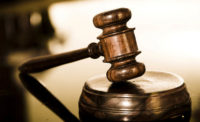Several food safety advocacy organizations have filed a legal action against the U.S. Department of Agriculture for issuing New Swine Inspection System (NSIS) rules that that they say undermine pork-safety inspection in slaughter plants.
Food & Water Watch (FWW) and the Center for Food Safety (CFS) are calling the new NSIS rules “a draconian reversal to the swine slaughter inspection system that has existed in the United States since 1906, which required meat inspectors to examine each animal for conditions like septicemia and salmonella before and after slaughter.” Read the full action here.
The new rules transfers inspection responsibilities to the slaughter companies themselves. They also surrender federal control over removing contamination from carcasses to slaughter companies without any minimum training requirements for slaughter-plant employees.
Public health protection
In its Federal Register publication of the rule, the USDA says the new inspection system “has been demonstrated to provide public health protection at least equivalent to the existing inspection system,” and that “hog slaughter establishments that do not choose to operate under the new swine inspection system may continue to operate under their existing inspection system.”
The agency also announced regulatory changes that allow swine slaughter establishments “to develop sampling plans that are more tailored to their specific operations, and thus more effective in monitoring their specific process control, unlike the current requirements in the regulations.”
Additionally, the NSIS lifted prior limits on slaughter-line speeds that were in place to prevent foodborne illnesses, hospitalizations, and deaths.
Foodborne illness
“Even with these line-speed limits, contaminated pork may cause as many as 1.5 million cases of foodborne illnesses, 7,000 hospitalizations, and 200 deaths in the United States each year,” according to FWW.
The lawsuit claims the USDA is acting beyond its authority in essentially leaving inspection up to slaughter companies and that the new rules are contrary to the Federal Meat Inspection Act.
“There is no gray area here. The new rules curtail the ability of federal inspectors to detect serious food-safety problems and expose those who consume such pork products to serious health threats like salmonella,” said Zach Corrigan, Senior Staff Attorney, Food & Water Watch. “It’s easy to read between the lines with these new rules: the USDA is letting the wolf guard the hog-house. Food safety is one of the most important protections in our country and gifting the slaughter industry self-regulation powers will mean pork eaters in this country will be facing higher threats of disease.”
“Reducing the number of trained federal inspectors and increasing line speeds is a recipe for disaster,” said Ryan Talbott, Staff Attorney for CFS. “USDA has an obligation to protect the health and welfare of consumers. USDA cannot do that when it takes a back seat and lets the slaughter plants largely regulate themselves.”
Impact on worker safety
The latest legal action follows a federal lawsuit filed against the rule in October 2019 by the United Food and Commercial Workers (UFCW) International Union, together with Public Citizen and UFCW Locals 663, 440 and 2.
UFCW International President Marc Perrone called the rule “a reckless giveaway to giant corporations” that would put thousands of workers in harm’s way,” said UFCW International President Marc Perrone.
That lawsuit alleges that the new rule violates the Administrative Procedure Act because it is not backed by reasoned decision-making.
Adam Pulver, an attorney with Public Citizen, which represents the complainants in the case, said the USDA “USDA admitted in its rule that it simply ignored the mounds of evidence that showed its actions will harm workers, while bending over backwards to help businesses.”
"Food safety is the number one priority"
However, the North American Meat Institute (NAMI) said the new NSIS system “has been studied and proposed over the last three presidential administrations” and noted that U.S. meat and poultry packers and processors “have every incentive to ensure their products are safe. Food safety is the number one priority in both NSIS and traditional pork plants.”
NAMI also said that advancements in food science, animal handling and meat processing have led to a decline in certain pathogens and injuries to workers over the past five decades.



